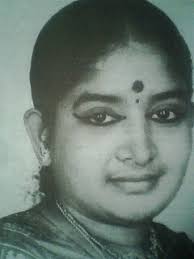




K. S. Chithra is a singer who has made her mark in the Indian (film) playback industry. Known as the “Nightingale of South India”, she has lent her voice to Malayalam, Tamil, Telugu, Kannada, Oriya, Hindi and Bengali films.
Born in Thiruvananthapuram the capital of Kerala state, K. S. Chitra, with her melodious voice, has built a formidable reputation as a playback singer for South Indian as well as Hindi films. She has to her credit, over 11,000 songs in languages like Tamil, Telugu, Malayalam, Hindi, Bengali and Oriya.
From her young age she learned the basics in music from her father, late Krishnan Nair who was a singer and composer of repute. The gifted singer learned music at the graduate and post-graduate levels and completed her B A in music with the third rank from the university. She went on to complete her MA in music from Kerala University, for which she was chosen under the aegis of the National Talent Search Scholarship programme and was trained by Professor K. Omanakutty.
Ms. Chithra got a chance in films when Prof. K. Omanakutty introduced her to her brother Mr. M. G. Radhakrishnan, a famous music director in Malayalam film industry. Her first songs were for the films like 'Attahaasam', 'Snehapoorvam Meera', and 'Njaan Ekananu' and from then on there was no looking back. Her expressive melodious voice got her plenty of offers and she was soon making a mark in Malayalam films to the extent that she has today monopolised Malayalam film music. Ilayaraja gave her the big break into Tamil films through his film 'Nee Thaanaa Antha Kuyil' but it was with 'Sindhu Bhairavi' she became a known name in Tamil industry which also won her the National Award for best playback singer. Ms Chitra's foray into Hindi film music was with the song 'Saathiya, ye tune kya kiya' in the film 'Love'. Some of the Hindi films that she has given hit songs are 'Pyaar Tune Kya Kiya', 'Aks', 'Ashoka', 'Rangeela' etc. She is one singer who has successfully broken the North-South divide and blazed a trail of glory in both worlds.
She has won the National Award for the best playback singer five times. For ' Sindhu Bhairavi' (Tamil, 1986),' Nakhashatangal' (Malayalam, 1987), ' Vaishali' (Malayalam, 1989 ), Minsara Kanavu (Tamil, 1996), Virasat (Hindi, 1997).
The Kerala government has heaped upon her the best playback singer award more than 12 times and she has the unique distinction of being the first female singer in the history of South Indian film playback singing to be honoured by all the four southern state governments as the best playback singer.
Chithra who has a strong base in classical music has an ability to pick up even the most difficult pitch with ease. Ms Chithra has many albums especially devotional music to her credit. She has also tried her hand in pop music and made an album with the 'Voodoo Rapper'. Her hugely successful albums include 'Piya Basanti'; her collaboration with sarangi exponent Ustad Sultan Khan, 'Sunset Point', where she worked with Gulzar and Bhupinder. She has had the opportunities to work with famous music directors like Salil Choudhary, Anu Malik, Nadeem-Shravan and world renowned music maestro A R Rahman. But she remains her simple down to earth self with the trademark pleasant smile. This immensely talented singer continues to impress her numerous fans with memorable songs.
Professional career
Born on July 27, 1963, in Thiruvananthapuram (Trivandrum), into a family of musicians, Chithra’s talent was recognized and nurtured from an early age by her father, the late Krishnan Nair. He was also her first guru (teacher). Chithra received her extensive training in Carnatic music from Dr. K.Omanakutty, after she was selected for the National Talent Search Scholarship from the Central Government from 1978 – 1984. She was introduced to Malayalam playback singing by Shri. M. G. Radhakrishnan in 1979. She made her debut in the Tamil film industry in Chennai under the guidance of film music composer Ilayaraaja. Lata Mangeshkar believes that Chithra is the best (next to herself). Even many Hindi music directors believe that Chithra is on par with Lata Mangeshkar and Asha Bhosle. She has worked with music directors such as Gulzar, Ustad Ali, Ghulam Ali, Anu Malik, and A. R. Rahman. She is the best female singer ever made in malayalam playback music.
Awards
To this day, Chithra has recorded thousands of film and non-film songs. During her career, numerous recognitions have come her way including six National Awards for best female playback singer. This is the largest number of national awards awarded to any female playback singer. She has won the awards for the following films:
-
1986 - Sindhu Bhairavi, Tamil film
-
1987 - Nakhaksthangal, Malayalam film
-
1989 - Vaisali, Malayalam film
-
1996 - Minsaara Kanavu, Tamil film
-
1997 - Virasat, Hindi film
-
2004 - Autograph, Tamil Film
She has also received 15 awards for the best female playback singer from Kerala State Government, 7 awards from Andhra State Government, 4 awards from Tamil Nadu State Government and 2 awards from Karnataka State Government. She holds the unique honour of the first male or female playback singer to be recognised by all the four state governments in South India as the best playback singer.
Other achievements
Chithra was also recognized with the Kalaimamani title from Tamil Nadu Government in 1997, the K. J. Yesudas Lifetime Achievement Award in 2004, Kalaiselvam title from the South Indian Nadigar Sangam in 2002, and the Lifetime Achievement Award from Global Malayalee Council in London in 2003. She has also received numerous mainstream awards like MTV Video Music Award, Screen – Videocon Award, Film Fans Association Awards, and Cinema Express Awards. She has in her credit, private albums in Hindi namely Piya Basanthi and Sunset Point. Her first ghazal album with Masterio Ghulam Ali and Asha Bhosle is ready for release. She recently released an album in dedication to Smt. Subbulakshmi named My Tribute. It is a collection of kirthis and bhajans dedicated to Subbulakshmi. Sony is planning to release a solo album soon owing to success of Piya Basanthi. Recognising her contribution to the music world, Smt. Chithra has been conferred the prestigious Padmashri title by the Government of India.
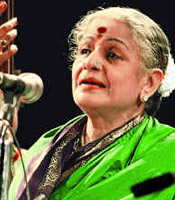 Born: September 16, 1916
Born: September 16, 1916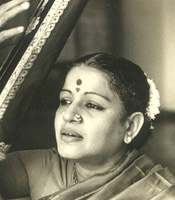 . These include Padma Bhushan in 1954, Sangeetha Kalanidhi in 1968 (She was the first woman recipient of the title), Ramon Magsaysay award in 1974, the Padma Vibhushan in 1975, the Kalidasa Samman in 1988, the Indira Gandhi Award for National Integration in 1990, and the Bharat Ratna in 1998. She was also honored as the court-singer of Tirumala Tirupati Devasthanams.
. These include Padma Bhushan in 1954, Sangeetha Kalanidhi in 1968 (She was the first woman recipient of the title), Ramon Magsaysay award in 1974, the Padma Vibhushan in 1975, the Kalidasa Samman in 1988, the Indira Gandhi Award for National Integration in 1990, and the Bharat Ratna in 1998. She was also honored as the court-singer of Tirumala Tirupati Devasthanams. Born - 6 July 1930
Born - 6 July 1930





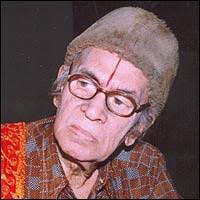









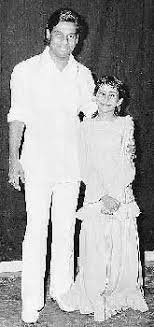
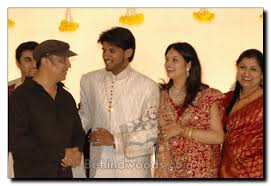


















![[IMG1633A.jpg]](https://blogger.googleusercontent.com/img/b/R29vZ2xl/AVvXsEijsrMsjOJeVkIx_olctGlDirtntcLHVLxwgv2hBl62yLbq3wVSimmR552CJCtFKajMWEWNtnxaniWGDbjPsorG9a_rzl5S-zs2G_qKXRXVJeIEKj1Zu7os53NUHOtbP36XVriIuNniMsXb/s1600/IMG1633A.jpg)



